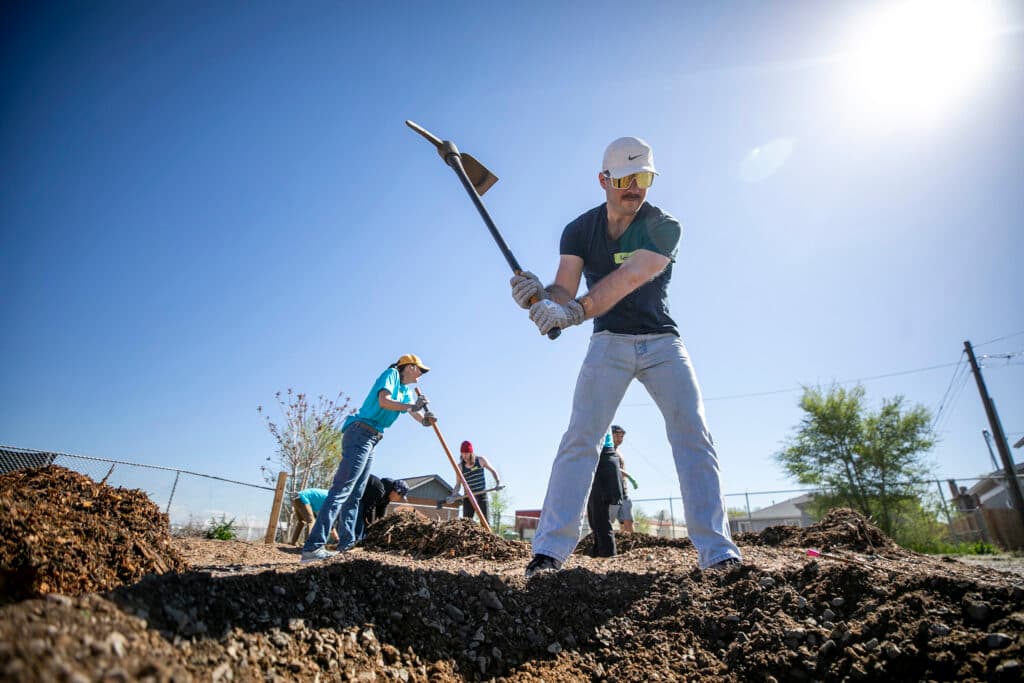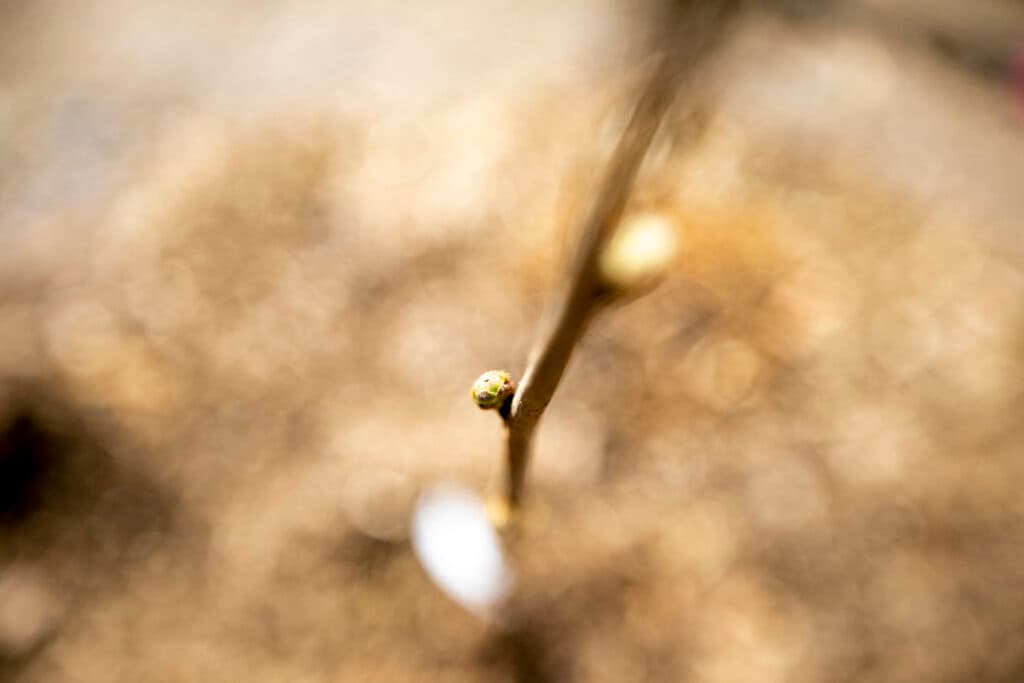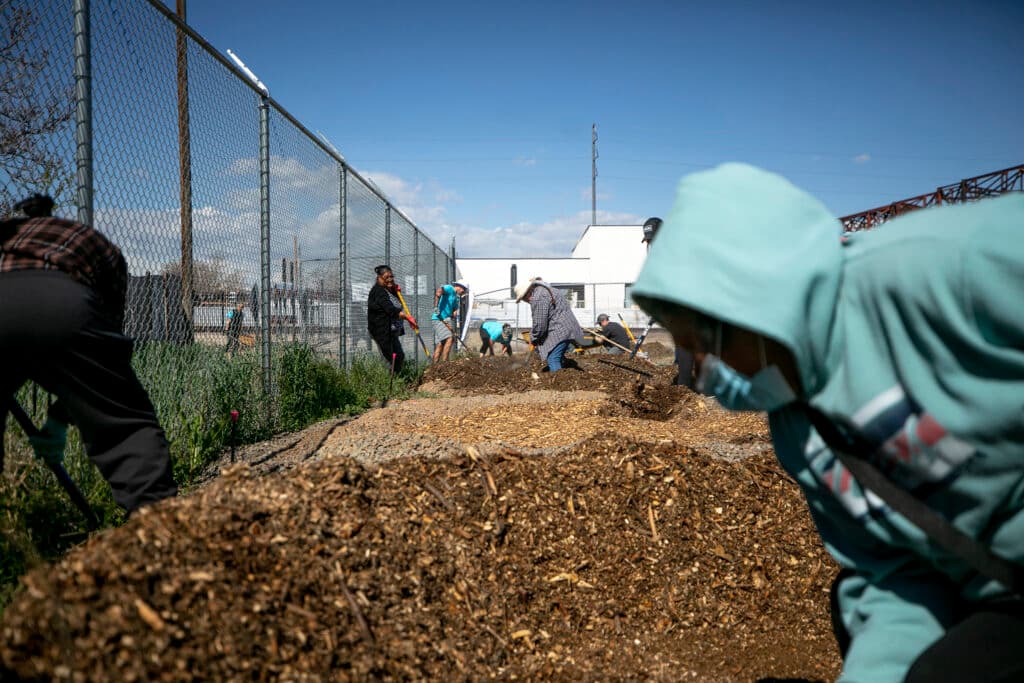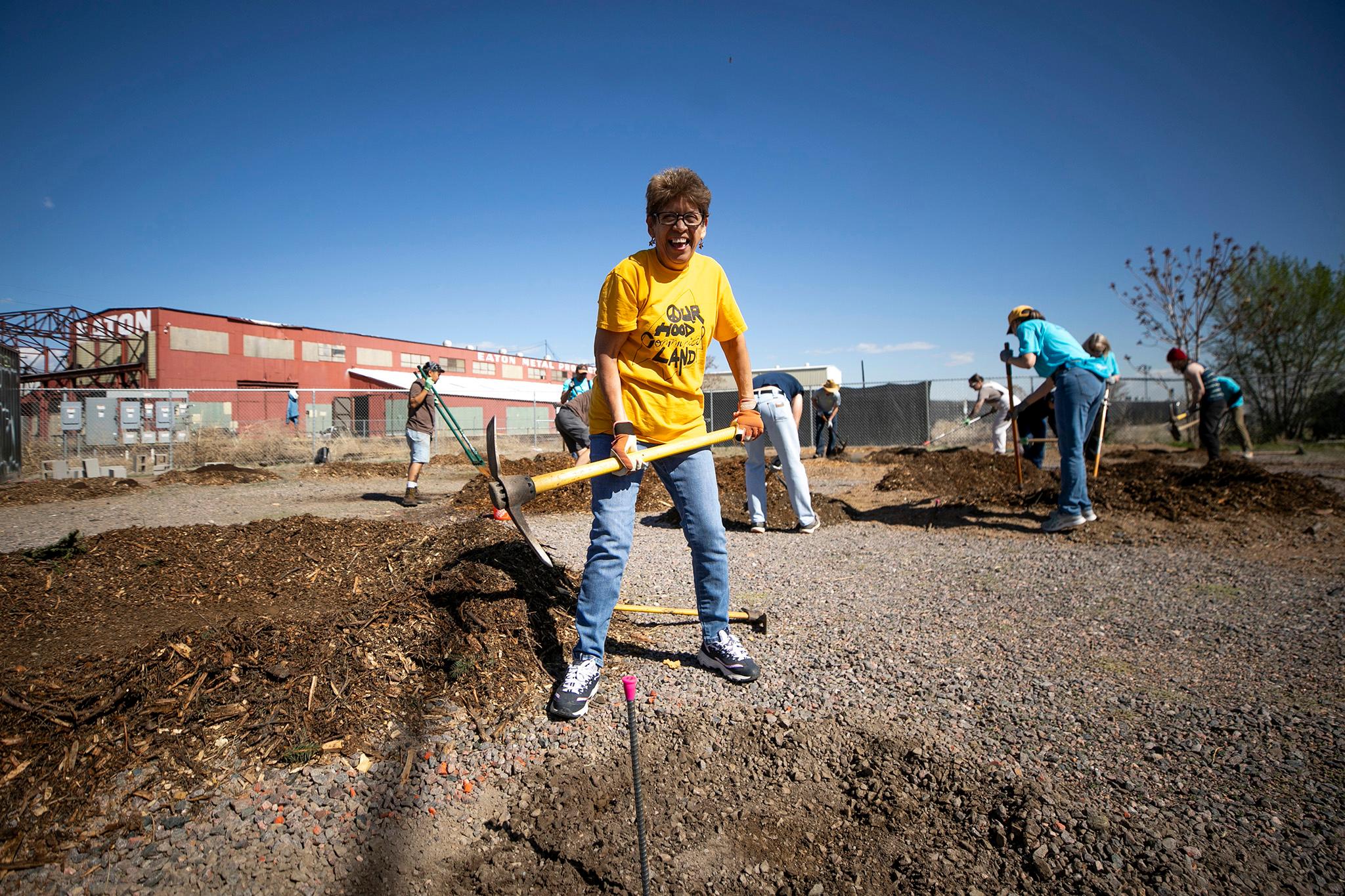As an oil train chugs by an empty lot in Elyria-Swansea, the sounds of its horn and clanging shovels fill the air.
The lot, while empty today, won’t always be -- hence the shovels.
One day a food forest will live at the end of Josephine Street pressed against the tracks and the Eaton Metal Products factory, creating a green space for residents and a spot to pick some fruit or vegetables.
Tierra Colectiva members and nearby residents put on their worker bee hats on a bright and sunny Wednesday to begin planting trees and shrubbery that will one day produce apples, pears, plums, jujubes, elderberries and more as part of the forest.

It’s one way the Colectiva, formed through the GES Coalition, is taking back their community from pollution, outside development and lack of city attention.
“We have a lot of random weird parcels that aren't super developable. So, why don't we make these into… these little oases for neighbors that are going to improve quality of life and mitigate pollution,” said Nola Miguel, the GES Coalition director. “Part of [preserving the neighborhood] is preserving space for open space use, which nobody else is going to do.”
Miguel said Colectiva initially considered purchasing the plot to building housing, which is what the group has traditionally done.
The land trust was launched in 2017 as a way to promote ownership and land stewardship in the GES area. Through ownership, the goal is to stop displacement and increase affordable housing so residents can stay in the area.

But with this lot in particular, the shape of it is odd and it’s up against the railroad tracks.
Miguel said instead of letting the land go, Colectiva purchased it to build the food forest.
Elyria-Swansea, and Globeville for that matter, have traditionally been home to industry. Smog from factories and highways clog the air and green spaces are limited.
But true neighborhoods, invested neighborhoods, include parks and green spaces and areas where neighborhoods can just relax on a hot May day. Purchasing land for green spaces is one way to make Elyria-Swansea a complete neighborhood.
And the timing was right. Miguel said at the start of Colectiva the focus was housing, and it still is, but as the houses come, why not look into other preservation options.
“As more and more people have become stabilized, we've realized the land trust that we want to do isn't just about housing. It is comprehensive,” Miguel said. “We want to preserve open land. We want to have neighborhood businesses be able to stay. We want to get grocery stores and those things that we've never been able to have. Tierra Colectiva can be this tool to do that. That's the vision that we're building out.”

GES Coalition member Mercedes Gonzalez (center) moves dirt for a new "food forest" at the end of Josephine Street. May 1, 2024. Kevin J. Beaty/Denverite
GES Coalition members Mercedes Gonzalez (left) and Raymunda Carreon plant a new "food forest" at the end of Josephine Street. May 1, 2024. Kevin J. Beaty/Denverite
Tierra Colectiva purchased the land with help from the Denver Park Trust, Metro Denver Nature Alliance and the groups Tierras Verdes, who held tamale fundraisers and similar community events.
The group also brought the Denver Urban Garden into the fold to help create the food forest, through the organization’s Etkin Family Foundation Food Forest Initiative. That started in 2022 and since DUG has created about 22 food forests throughout Metro Denver.
So, what’s a food forest?
For those with no green thumbs, a food forest is a combination of fruiting trees and other edible and medicinal plants that essentially grow in layers, according to Niki Barouxis, DUG’s food forest coordinator.
Barouxis said a food forest is planted in seven layers: a giant shade or canopy layer, fruit trees, vines, shrubs, bush, root and a herbaceous layer. They're all perennial plants, so there’s no need to reseed. The plants will work together, creating an ecosystem that at first will need a bit of tending with watering and pruning but will eventually self-sustain.

“The different layers of the food forest provide benefits for the other layers. The taller trees can provide shade for some bushes that like shaded areas to grow so they don't get burned by the sun,” Barouxis said. “At DUG, the way that we are approaching food forestry is through public access… So anyone walking through years down the road, once these are bearing lots of fruit, will be able to just pick from it.”
It takes about three to four years for the trees and plants to fully develop. But that gives the community time to figure out what else can go on that lot.
Miguel said the community is thinking about access, opening the alleyways for easy travel to Swansea Recreation Center, Swansea Park and Our Lady of Grace Church. Focus Points is also in the area with their Huerta Urbana farm. There’s ideas for picnic tables and charging stations. As long as the space is activated for residents, it’ll be a success.

A baby hazelnut tree planted by GES Coalition members and volunteers for a new "food forest" at the end of Josephine Street. May 1, 2024. Kevin J. Beaty/Denverite
Baby hazelnut trees planted by GES Coalition members and volunteers for a new "food forest" at the end of Josephine Street. May 1, 2024. Kevin J. Beaty/Denverite
Coalition member Maria De Luna Jimenez said this plot of land will differ from other community gardens because no one will be charged for anything. You don’t have to buy a plot to grow anything. None of the fruit will be for sale when it blossoms.
Just come and enjoy.
“Todo lo que cosechemos va a ser directo para la comunidad. Nada para vender,” De Luna Jimenez said. She added that she loves this idea because whenever the community wants land or more greenery, they’re met with “no tenemos el dinero.”
"Creo que si queremos hacer algo y nos juntamos, lo podemos lograr," De Luna Jimenez said. When the community comes together, they can achieve things themselves.
She adds, if there’s land for sale in GES, call the Colectiva.














